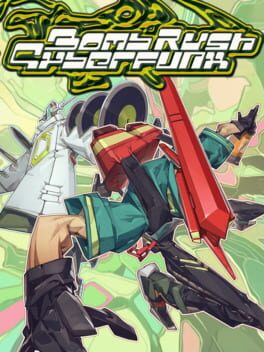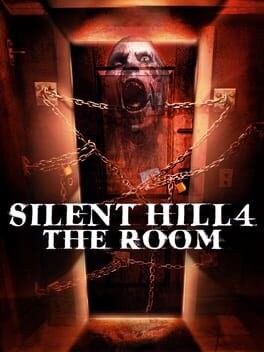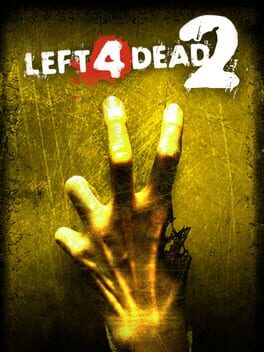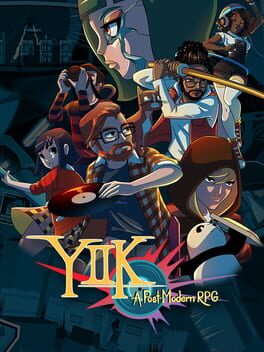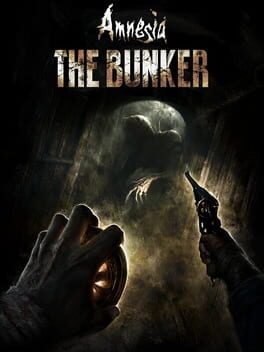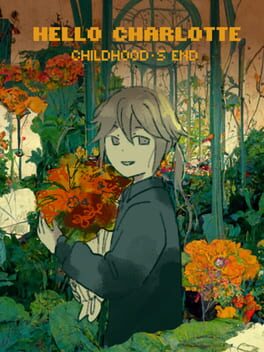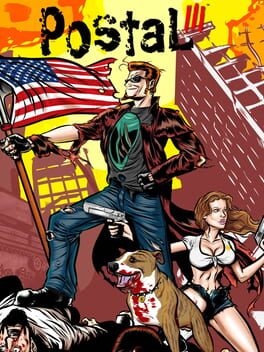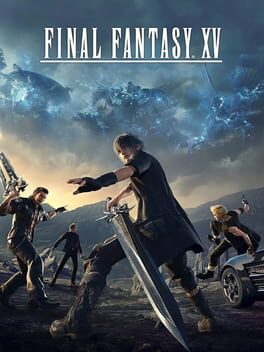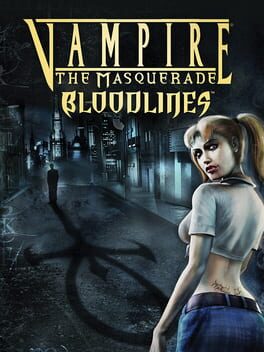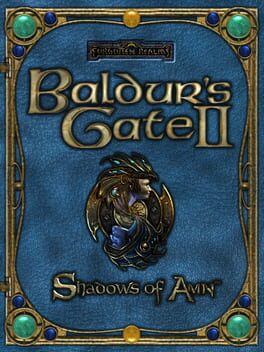FullyOttoMatic
BACKER
37 reviews liked by FullyOttoMatic
Bomb Rush Cyberfunk
2023
I love JSR and JSRF, but I didn't really feel this as much as I wanted to. It’s lacking the energy and verve of JSR and JSRF. Part of that may be the lack of voice acting, but the OST also feels kinda… orthodox in a way that the other games felt unconventional.
The levels have very little going on in the way of environmental interaction, making the gameplay feel less involved. The levels in JSRF in particular, were more intricate, even down to the atmosphere, with lots of moving NPCs, vehicles, and environmental hazards.
I don't know; this game just feels… lifeless, and that’s a huge fucking bummer.
The mini-game for spraying graffiti is detrimental to the momentum of the traversal since it completely stops you. The best way to do it is to aimlessly roll your stick in circles so it feels superfluous and out of place.
The levels have very little going on in the way of environmental interaction, making the gameplay feel less involved. The levels in JSRF in particular, were more intricate, even down to the atmosphere, with lots of moving NPCs, vehicles, and environmental hazards.
I don't know; this game just feels… lifeless, and that’s a huge fucking bummer.
The mini-game for spraying graffiti is detrimental to the momentum of the traversal since it completely stops you. The best way to do it is to aimlessly roll your stick in circles so it feels superfluous and out of place.
Content warning for non-explicit discussion of real life death, expulsion of bodily waste and fluids, pregnancy, childbirth, needle use in a medical context
-------------------------------------------------------------------------------------------------------------------------
I am a woman. My experience as a woman is one of the less common ones, statistically, because I didn’t have it in me to assert that I was one until a good quarter century after most women are informed that this is what they are. That there are rules to this, and ways to perform womanhood, and perhaps most importantly for a lot of people, certain baseline genetic requirements that separate women from non-women. That last part is the sticky one for me, and because of this there are a lot of people out in the world who hate me, who want me to simply not be. Many of these people are powerful and they make decisions every day about my privilege to exist, but many many more of them are regular people out in the world. Sometimes it’s easy to tell who they are by the looks they give, the things they say; sometimes it’s not so immediately obvious. It is stressful to go outside, often, and occasionally it is outright difficult. Nevertheless, I am a woman.
-------------------------------------------------------------------------------------------------------------------------
Julia Kristeva is a Bulgarian-French writer who has been prolific in many fields over her six decades of writing, but I often find myself thinking of her most famous work, one of her earliest publications - 1980’s Powers of Horror: An Essay on Abjection, because it is the only thing by her that I’ve read. It’s a 200-ish page book that builds heavily on old Freudian theory to, among other things, consider the ways people use powerfully negative experiences to define and value the self.
Kristeva defines abjection like this: “The human reaction to a threatened breakdown in meaning caused by the loss of the distinction between subject and object or between self and other.” Abjection, in a way, forces us to choose our identity; we define ourselves via rejection, by how we think of ourselves in opposition to things that disgust or harm us. It preys upon this idea of selfhood, of the boundaries we construct and maintain to create identity. It preys upon the divisions we create when we erect these boundaries. One example of this that Kristeva uses is things we naturally expel from our bodies, stuff like blood from a wound, teeth that fall out, semen, piss, shit, vomit. One second these things are subject – they’re part of you – and the next they’re object – separate from you entirely. This may not seem like much but this intrinsic mental separation from what was a part of you as soon as it leaves your body highlights how fragile these boundaries actually are.
I am, because I am not.
Kristeva thinks it’s a thin line.
She most often frames abjection in terms of violence, revulsion, disgust, and trauma. And it’s true that we tend to use the word “abject” as a maximalist adjective to highlight negative things. Abject terror. Abject misery. Abject poverty. But for Kristeva it’s not actually a bad thing in the grand view; on the contrary it’s an essential part of making us who we are as a collective and as individuals. She talks a lot about childbirth as the first moment of abjection. Birth being as much a kid fighting to live, to create a self, a sense of being, even as they tear away from the safety of their mother’s womb. It’s an inherently violent act and it’s the only way to become. It’s an ongoing process throughout life; kids have values imposed on them - language, culture, law - all things contrary to totally natural impulses but also things that most of us agree are necessary for them to grow into society as we know it. This is a process that repeats constantly throughout life to varying degrees. It can be painful, horrible, and disgusting, but it’s necessary. These experiences sharpen our sense of who we are, in our sense of opposition to the things that cause us pain, horror, and disgust.
I am not, so I am.
-------------------------------------------------------------------------------------------------------------------------
Silent Hill 4: The Room has, if I’m remembering all My Gaming from last year correctly, the largest cast of characters of any Team Silent game, but it is almost entirely concerned with the thematic opposition of its player character, Henry Townshend, and its central figure and villain, Walter Sullivan. Henry is cursed, you see, trapped inside of his apartment by supernatural forces, unable to be seen or heard by anyone on the outside even as he becomes increasingly aware of a deadly, ghostly threat haunting the complex and its inhabitants. Walter uh, IS that threat, the ghost of a serial killer returned partially from the grave to finish his cruel sacrament with the six-ish murders he had to leave off in life (all according to his grand plan, of course). His ultimate goal, it’s eventually revealed, is to get permanent access to Henry’s apartment, which he sees as the vessel for his own mother, whose spirit he believes will awaken when he completes his twenty-one ritual murders.
Walter has a tragic past, raised within an evil cult, abused constantly by his caretakers, turned out onto uncaring streets with only his brainwashing and occult dogma to motivate him to go on. He’s a man who experiences moments of abjection and rejects them, becoming singularly focused on rescinding his identity. He is in constant pursuit of a mother he doesn’t remember, his mission to return permanently to the safety of her womb, where he can exist eternally, unburdened and unfettered by both his trauma and his self.
In all of the early Silent Hill games, aspects of the world take on attributes specific to the psyches of particular characters central to the story, and in The Room that person is Walter himself, whose fears and hates dictate the worlds that Henry and his neighbors are dragged into throughout the game. Walter’s fears are decidedly more mundane than previous Silent Hill fear generators, with environments like normal forests and subway stations, urban blocks and apartment complexes. Walter is afraid of, generally speaking, the Out There. He wants to retreat. Enemies are other people. They squish, they slurp, they burp grotesquely (bodily expulsion is a hallmark of abject experience, remember). Ghosts pursue you doggedly, without pause, and the worst thing they can do is just be present, their very auras radiating sinister energy that hurts Henry without action.
Henry himself is a mirror to Walter, trapped seemingly eternally in the thematic womb, his only escape the long long tunnel that forms in his bathroom wall, one that spawns him into these frightening outside worlds, often in the fetal position (I know writers who use subtlety and they’re all cowards, etc). While he does face trauma in these worlds and after every moment of abjection retreats back to his apartment for nourishment and healing, Henry does, ultimately, want to get the fuck outta there bro. He’s desperate for human connection too (and connection beyond murder – his moments of abjection always come via Walter doing something fucked up to one of his neighbors), desperate enough to peep on his direct next door neighbor Eileen through a hole that a previous tenant left in their shared wall. Tellingly, Henry can’t even begin to have a real connection to Eileen, or anyone, until he symbolically begins to separate himself from the room; once they meet for real and succeed in evading Walter’s attacks for the first time, the room stops healing Henry, and becomes open to hauntings that actively harm him.
The titular room is Henry’s place of refuge and comfort, at first, but it’s also his ultimate enemy. This is true the entire game, not just after Walter’s influence begins to infect the space. He’ll die if he stays here. He has precious little food, and during gameplay he gives away his last bottle of chocolate milk (milk being one of Kristeva’s confessed personal objects of great disgust, in a moment of fun serendipity). He has no one to interact with, and even though it’s stated in game that he was not a social guy before he was cursed, once you’re down to zero everything seems like a lifeline. Eventually, of course, he’ll be literally killed by the curses that infect the room. He can’t stay. He needs to be born, and he knows it. It’s a false security, and it intrinsically can’t last.
Walter and Henry aren’t the only figures central to the game, though. There is, of course, a third pillar here: you. Er, me. Y’know, The Player. There is essentially nothing to Henry – this is part of why he exists primarily as a thematic contrast to Walter, and part of why it’s hard to ascribe much character to his actions. You’re Henry in large part. When he’s in the apartment you even control him in first person. You are the ultimate voyeur, in the same way that Henry is to Eileen and Walter is to Henry. And this is part of why Walter’s worlds and the creatures that populate them are on the surface so much more generic than the places and monsters of past games: applicability.
-------------------------------------------------------------------------------------------------------------------------
I have this uncle who died in his apartment. I didn’t know him, really. From stuff I’ve been told he wasn’t a good guy. I was a kid, and we lived states away. I only met him a handful of times at big family parties. The only reason I ever think about him at all probably is because he died in his apartment, and even then I’ve only started thinking about him so much recently, in the last couple of years, because we’ve all been spending a lot more time in our apartments. It’s covid, bay bee. The reason I think about him so much is because when he died in his apartment, nobody knew. Nobody cared to check in. They only found him, weeks later, because his landlord went into his place because they had assumed he had run out on it because he hadn’t paid rent or responded to any communication, for weeks, because he was dead.
So I think about that a lot the last couple years.
-------------------------------------------------------------------------------------------------------------------------
I mentioned that Walter’s hellscapes are mundane places and his monsters are other people and I do think this is a reflection of where the developers thought maybe a lot of their presumed audience was at when Silent Hill 4 came out. Which is pretty funny. But it’s real, too, for me. There’s not a lot that’s scarier for me as a trans person than An Only Vaguely Familiar Public Place With An Off Vibe. That’s alarm bell central. It’s hard out there, man. Rarely do I feel outright unsafe but often do I feel eyes. It’s difficult to tell a lot of the time if the eyes are real or if I’m inventing them, and that doubt can make it even harder to feel confident in my place in perfectly normal spaces. Just yesterday I was actively frightened waiting in line for the bathroom in an inexplicably crowded gas station in the middle of nowhere in Iowa. You just never know when it’s going to be a problem. I was never the most confident person, but this low level thrum of unease colors every moment of public life. In talking about abjection in an academic sense and especially when talking about fiction it’s easy to forget that part of it is that it is upsetting by nature. But in life it sharpens me. I know who I am.
It’s a harsh dichotomy – every day I am more visibly transgender in more irreversible physical ways. Every day I become more obviously Neither Male Nor Female and while I love this about myself and I am truly happy with these changes they are the same changes that make me less safe and more vulnerable in ways that become harder and harder to cover up with clothes and masks. It would be easy to retreat to my womb, metaphorically. I want to, sometimes. I work remotely on a permanent basis. I live literally across the street from the grocery store. My girlfriend is here, my cats are here, my friends are online.
But I am transforming. Every week I stab myself with a needle. I force through this needle the fluid that makes my body into what I want it to be. A violent transmogrification. I feel the most beautiful in these moments. They are moments of clarity, of self expression, of definition by rejection. I am not a man. I am a woman. This needle in my leg is my signature. Living in fear of living in fear can’t be the way.
I am not who I was. I oppose that. I am becoming. Every week I am new. I need to tear away.
I want to be born.
-------------------------------------------------------------------------------------------------------------------------
I am a woman. My experience as a woman is one of the less common ones, statistically, because I didn’t have it in me to assert that I was one until a good quarter century after most women are informed that this is what they are. That there are rules to this, and ways to perform womanhood, and perhaps most importantly for a lot of people, certain baseline genetic requirements that separate women from non-women. That last part is the sticky one for me, and because of this there are a lot of people out in the world who hate me, who want me to simply not be. Many of these people are powerful and they make decisions every day about my privilege to exist, but many many more of them are regular people out in the world. Sometimes it’s easy to tell who they are by the looks they give, the things they say; sometimes it’s not so immediately obvious. It is stressful to go outside, often, and occasionally it is outright difficult. Nevertheless, I am a woman.
-------------------------------------------------------------------------------------------------------------------------
Julia Kristeva is a Bulgarian-French writer who has been prolific in many fields over her six decades of writing, but I often find myself thinking of her most famous work, one of her earliest publications - 1980’s Powers of Horror: An Essay on Abjection, because it is the only thing by her that I’ve read. It’s a 200-ish page book that builds heavily on old Freudian theory to, among other things, consider the ways people use powerfully negative experiences to define and value the self.
Kristeva defines abjection like this: “The human reaction to a threatened breakdown in meaning caused by the loss of the distinction between subject and object or between self and other.” Abjection, in a way, forces us to choose our identity; we define ourselves via rejection, by how we think of ourselves in opposition to things that disgust or harm us. It preys upon this idea of selfhood, of the boundaries we construct and maintain to create identity. It preys upon the divisions we create when we erect these boundaries. One example of this that Kristeva uses is things we naturally expel from our bodies, stuff like blood from a wound, teeth that fall out, semen, piss, shit, vomit. One second these things are subject – they’re part of you – and the next they’re object – separate from you entirely. This may not seem like much but this intrinsic mental separation from what was a part of you as soon as it leaves your body highlights how fragile these boundaries actually are.
I am, because I am not.
Kristeva thinks it’s a thin line.
She most often frames abjection in terms of violence, revulsion, disgust, and trauma. And it’s true that we tend to use the word “abject” as a maximalist adjective to highlight negative things. Abject terror. Abject misery. Abject poverty. But for Kristeva it’s not actually a bad thing in the grand view; on the contrary it’s an essential part of making us who we are as a collective and as individuals. She talks a lot about childbirth as the first moment of abjection. Birth being as much a kid fighting to live, to create a self, a sense of being, even as they tear away from the safety of their mother’s womb. It’s an inherently violent act and it’s the only way to become. It’s an ongoing process throughout life; kids have values imposed on them - language, culture, law - all things contrary to totally natural impulses but also things that most of us agree are necessary for them to grow into society as we know it. This is a process that repeats constantly throughout life to varying degrees. It can be painful, horrible, and disgusting, but it’s necessary. These experiences sharpen our sense of who we are, in our sense of opposition to the things that cause us pain, horror, and disgust.
I am not, so I am.
-------------------------------------------------------------------------------------------------------------------------
Silent Hill 4: The Room has, if I’m remembering all My Gaming from last year correctly, the largest cast of characters of any Team Silent game, but it is almost entirely concerned with the thematic opposition of its player character, Henry Townshend, and its central figure and villain, Walter Sullivan. Henry is cursed, you see, trapped inside of his apartment by supernatural forces, unable to be seen or heard by anyone on the outside even as he becomes increasingly aware of a deadly, ghostly threat haunting the complex and its inhabitants. Walter uh, IS that threat, the ghost of a serial killer returned partially from the grave to finish his cruel sacrament with the six-ish murders he had to leave off in life (all according to his grand plan, of course). His ultimate goal, it’s eventually revealed, is to get permanent access to Henry’s apartment, which he sees as the vessel for his own mother, whose spirit he believes will awaken when he completes his twenty-one ritual murders.
Walter has a tragic past, raised within an evil cult, abused constantly by his caretakers, turned out onto uncaring streets with only his brainwashing and occult dogma to motivate him to go on. He’s a man who experiences moments of abjection and rejects them, becoming singularly focused on rescinding his identity. He is in constant pursuit of a mother he doesn’t remember, his mission to return permanently to the safety of her womb, where he can exist eternally, unburdened and unfettered by both his trauma and his self.
In all of the early Silent Hill games, aspects of the world take on attributes specific to the psyches of particular characters central to the story, and in The Room that person is Walter himself, whose fears and hates dictate the worlds that Henry and his neighbors are dragged into throughout the game. Walter’s fears are decidedly more mundane than previous Silent Hill fear generators, with environments like normal forests and subway stations, urban blocks and apartment complexes. Walter is afraid of, generally speaking, the Out There. He wants to retreat. Enemies are other people. They squish, they slurp, they burp grotesquely (bodily expulsion is a hallmark of abject experience, remember). Ghosts pursue you doggedly, without pause, and the worst thing they can do is just be present, their very auras radiating sinister energy that hurts Henry without action.
Henry himself is a mirror to Walter, trapped seemingly eternally in the thematic womb, his only escape the long long tunnel that forms in his bathroom wall, one that spawns him into these frightening outside worlds, often in the fetal position (I know writers who use subtlety and they’re all cowards, etc). While he does face trauma in these worlds and after every moment of abjection retreats back to his apartment for nourishment and healing, Henry does, ultimately, want to get the fuck outta there bro. He’s desperate for human connection too (and connection beyond murder – his moments of abjection always come via Walter doing something fucked up to one of his neighbors), desperate enough to peep on his direct next door neighbor Eileen through a hole that a previous tenant left in their shared wall. Tellingly, Henry can’t even begin to have a real connection to Eileen, or anyone, until he symbolically begins to separate himself from the room; once they meet for real and succeed in evading Walter’s attacks for the first time, the room stops healing Henry, and becomes open to hauntings that actively harm him.
The titular room is Henry’s place of refuge and comfort, at first, but it’s also his ultimate enemy. This is true the entire game, not just after Walter’s influence begins to infect the space. He’ll die if he stays here. He has precious little food, and during gameplay he gives away his last bottle of chocolate milk (milk being one of Kristeva’s confessed personal objects of great disgust, in a moment of fun serendipity). He has no one to interact with, and even though it’s stated in game that he was not a social guy before he was cursed, once you’re down to zero everything seems like a lifeline. Eventually, of course, he’ll be literally killed by the curses that infect the room. He can’t stay. He needs to be born, and he knows it. It’s a false security, and it intrinsically can’t last.
Walter and Henry aren’t the only figures central to the game, though. There is, of course, a third pillar here: you. Er, me. Y’know, The Player. There is essentially nothing to Henry – this is part of why he exists primarily as a thematic contrast to Walter, and part of why it’s hard to ascribe much character to his actions. You’re Henry in large part. When he’s in the apartment you even control him in first person. You are the ultimate voyeur, in the same way that Henry is to Eileen and Walter is to Henry. And this is part of why Walter’s worlds and the creatures that populate them are on the surface so much more generic than the places and monsters of past games: applicability.
-------------------------------------------------------------------------------------------------------------------------
I have this uncle who died in his apartment. I didn’t know him, really. From stuff I’ve been told he wasn’t a good guy. I was a kid, and we lived states away. I only met him a handful of times at big family parties. The only reason I ever think about him at all probably is because he died in his apartment, and even then I’ve only started thinking about him so much recently, in the last couple of years, because we’ve all been spending a lot more time in our apartments. It’s covid, bay bee. The reason I think about him so much is because when he died in his apartment, nobody knew. Nobody cared to check in. They only found him, weeks later, because his landlord went into his place because they had assumed he had run out on it because he hadn’t paid rent or responded to any communication, for weeks, because he was dead.
So I think about that a lot the last couple years.
-------------------------------------------------------------------------------------------------------------------------
I mentioned that Walter’s hellscapes are mundane places and his monsters are other people and I do think this is a reflection of where the developers thought maybe a lot of their presumed audience was at when Silent Hill 4 came out. Which is pretty funny. But it’s real, too, for me. There’s not a lot that’s scarier for me as a trans person than An Only Vaguely Familiar Public Place With An Off Vibe. That’s alarm bell central. It’s hard out there, man. Rarely do I feel outright unsafe but often do I feel eyes. It’s difficult to tell a lot of the time if the eyes are real or if I’m inventing them, and that doubt can make it even harder to feel confident in my place in perfectly normal spaces. Just yesterday I was actively frightened waiting in line for the bathroom in an inexplicably crowded gas station in the middle of nowhere in Iowa. You just never know when it’s going to be a problem. I was never the most confident person, but this low level thrum of unease colors every moment of public life. In talking about abjection in an academic sense and especially when talking about fiction it’s easy to forget that part of it is that it is upsetting by nature. But in life it sharpens me. I know who I am.
It’s a harsh dichotomy – every day I am more visibly transgender in more irreversible physical ways. Every day I become more obviously Neither Male Nor Female and while I love this about myself and I am truly happy with these changes they are the same changes that make me less safe and more vulnerable in ways that become harder and harder to cover up with clothes and masks. It would be easy to retreat to my womb, metaphorically. I want to, sometimes. I work remotely on a permanent basis. I live literally across the street from the grocery store. My girlfriend is here, my cats are here, my friends are online.
But I am transforming. Every week I stab myself with a needle. I force through this needle the fluid that makes my body into what I want it to be. A violent transmogrification. I feel the most beautiful in these moments. They are moments of clarity, of self expression, of definition by rejection. I am not a man. I am a woman. This needle in my leg is my signature. Living in fear of living in fear can’t be the way.
I am not who I was. I oppose that. I am becoming. Every week I am new. I need to tear away.
I want to be born.
Final Fantasy VII
1997
This review contains spoilers
An interesting thing about a game that has perhaps the most spoiled moment in video games is that when you play through it for the first time, you can’t exactly get that thought off your mind. The second cloud meets Aerith it becomes tragedy, a slowly marching clock to when the big moment comes. And in between those moments you play a pretty good rpg. I suppose this sort of inevitability is what the remake trilogy thrives on, even for my own personal time spent in 7’s occasionally industrial mostly classic fantasy world I am, in some way creating my own final fantasy 7 remake. Every time you use an ability is a reminder of what’s going to come next, a cute date sequence becomes the closest thing both characters have to what could have been, and even if you’re able to recognize the point of which it happens you hope in the back of your mind that it won’t happen, that maybe there’s a one in a trillion chance she lives. But then Sephiroth plunges down and shifts the story.
A less spoken on benefit to one of gaming’s biggest spoilers is that it acts as a lightning rod for the rest of the game. While I may have the cutscene of Aerith’s deaths memorized through sheer cultural osmosis, I saw even more beautiful, quiet and poignant stories about people who live in a beautiful world and wish to fight for it. The world of Final Fantasy VII is full of people, people with dreams and aspirations who may impact your life even if they were in them for a brief moment. Memories are a beautiful thing, but they are designed to drift away, leaving mossy ruins where there once was a city.
A less spoken on benefit to one of gaming’s biggest spoilers is that it acts as a lightning rod for the rest of the game. While I may have the cutscene of Aerith’s deaths memorized through sheer cultural osmosis, I saw even more beautiful, quiet and poignant stories about people who live in a beautiful world and wish to fight for it. The world of Final Fantasy VII is full of people, people with dreams and aspirations who may impact your life even if they were in them for a brief moment. Memories are a beautiful thing, but they are designed to drift away, leaving mossy ruins where there once was a city.
Left 4 Dead 2
2009
Baldur's Gate 3
2020
Spec Ops: The Line
2012
This review contains spoilers
you know what? fuck it. spec ops: the line is worth five stars and then some. for a long time i sat on the fence about it, and had it collecting dust, uncommentated, at 4.5 stars - no more.
the fact this game was shuffled out-of-sight by 2k games, that an attempt is being made to erase its existence from the public under dubious pretenses at worst, or that it's been dropped in a double-whammy of corporate greed and convenient timing at best, shows us that this game is just as sorely needed now as it was 12 years ago.
many like to do a little joking about its "look what i made you do"-narrative, but those people are unaware that this precise portrayal of leadership at the hands of a vague authority is part of the point. this is taking down not merely the modern military shooter alone, but the entirety of the military industrial complex and its implications. the game design here is a direct analogue of the military chain of command, and the way it attempts to dissuade individuals and society as a whole from seeking blame in the hands of the actor.
on february 25th 2024, united states airforce member aaron bushnell self-immolated rather than continuing to maintain part in the u.s. military's support of yet another genocide - a genocide funded and fueled by this global force for despicable violence, a genocide committed, in part, with white phosphorous used against a civilian population.
the timing is just a bit TOO on-the-nose. we are supposed to forget that the same thing fuels this propaganda as fuels the systematic dehumanisation and killing of several peoples in asia and africa. spec ops, unlike every single other "modern military shooter", didnt flinch, and didnt lie. and for that, it had to disappear.
this is the only game that had the guts to give the player a gun, and let them shoot at a peaceful civilian population - then stand there with the implications of their actions. no fade-out. no game over. only you and the simulacrum of a dead body.
from the river to the sea, palestine will be free.
the fact this game was shuffled out-of-sight by 2k games, that an attempt is being made to erase its existence from the public under dubious pretenses at worst, or that it's been dropped in a double-whammy of corporate greed and convenient timing at best, shows us that this game is just as sorely needed now as it was 12 years ago.
many like to do a little joking about its "look what i made you do"-narrative, but those people are unaware that this precise portrayal of leadership at the hands of a vague authority is part of the point. this is taking down not merely the modern military shooter alone, but the entirety of the military industrial complex and its implications. the game design here is a direct analogue of the military chain of command, and the way it attempts to dissuade individuals and society as a whole from seeking blame in the hands of the actor.
on february 25th 2024, united states airforce member aaron bushnell self-immolated rather than continuing to maintain part in the u.s. military's support of yet another genocide - a genocide funded and fueled by this global force for despicable violence, a genocide committed, in part, with white phosphorous used against a civilian population.
the timing is just a bit TOO on-the-nose. we are supposed to forget that the same thing fuels this propaganda as fuels the systematic dehumanisation and killing of several peoples in asia and africa. spec ops, unlike every single other "modern military shooter", didnt flinch, and didnt lie. and for that, it had to disappear.
this is the only game that had the guts to give the player a gun, and let them shoot at a peaceful civilian population - then stand there with the implications of their actions. no fade-out. no game over. only you and the simulacrum of a dead body.
from the river to the sea, palestine will be free.
Timeline of events:
I'm a games writer, and I was feeling bad about my work. I'm also a fan of postmodernist fiction. I thought: "Surely, comparing what I like and what I do to YIIK, a notoriously awful game, I'll feel better about myself." I bought it later, when it was on sale.
Now, I've played an hour and 9 minutes of it.
I did not know.
Even four years down the line, YIIK's developers do not understand... anything that makes a game coherent, and hold somebody's attention. We can't even talk about "good" here - this is not in the same star system as a "good" game.
At the start it's a thousand pinpricks. As it continues, they ramp up and turn into drills. And make no mistake: No video essay talking about it can make you understand how bad that feels to play.
Basic feedback for most player actions is absent; actions such as setting the Panda-barrier cannot be cancelled out of; the music meanders without skill or purpose; the graphical style has small inconsistencies and errors that would've been easily fixed, but never were; NPCs are either cardboard, or just the worst babblers I've ever seen anyone write. Statements that could take 2-3 text boxes and one selection screen take 20.
I genuinely thought this game could make me feel better; instead, I feel like I smugly punched a kid. With less time, fewer resources, more rudimentary tools, *I, and YOU* could create something better than this.
I spent money, and that's fine. I also put part of my soul as tribute on it when I put it in comparison to what I do, thinking that comparison would be anything but a let-down. And that is not fine. I want my soul back, YIIK.
I've abandoned it. I don't intend on picking it up again, even if it updates. Don't buy it. It's not even funny; it's just sad, and will make you feel sad, too.
I'm a games writer, and I was feeling bad about my work. I'm also a fan of postmodernist fiction. I thought: "Surely, comparing what I like and what I do to YIIK, a notoriously awful game, I'll feel better about myself." I bought it later, when it was on sale.
Now, I've played an hour and 9 minutes of it.
I did not know.
Even four years down the line, YIIK's developers do not understand... anything that makes a game coherent, and hold somebody's attention. We can't even talk about "good" here - this is not in the same star system as a "good" game.
At the start it's a thousand pinpricks. As it continues, they ramp up and turn into drills. And make no mistake: No video essay talking about it can make you understand how bad that feels to play.
Basic feedback for most player actions is absent; actions such as setting the Panda-barrier cannot be cancelled out of; the music meanders without skill or purpose; the graphical style has small inconsistencies and errors that would've been easily fixed, but never were; NPCs are either cardboard, or just the worst babblers I've ever seen anyone write. Statements that could take 2-3 text boxes and one selection screen take 20.
I genuinely thought this game could make me feel better; instead, I feel like I smugly punched a kid. With less time, fewer resources, more rudimentary tools, *I, and YOU* could create something better than this.
I spent money, and that's fine. I also put part of my soul as tribute on it when I put it in comparison to what I do, thinking that comparison would be anything but a let-down. And that is not fine. I want my soul back, YIIK.
I've abandoned it. I don't intend on picking it up again, even if it updates. Don't buy it. It's not even funny; it's just sad, and will make you feel sad, too.
Amnesia: The Bunker
2023
fumbling in the dark
The bunker is a smaller, narratively unambitious left-turn for Frictional. While they tinker away with what I assume is a larger, SOMA-like project, here they've shed much of the weight they’ve accumulated over the years, weight that really dragged Rebirth down, and turned their attention back to the moment-to-moment mechanics. They’ve finally confronted the minimalistic hide-and-seek gameplay that has become increasingly tired, and re-embraced tools & limited weapons (last seen in their Penumbra series).
The immersive sim approach to puzzles allows for multiple solutions & is simple and direct: every tool is a key, a distraction or a temporary defense. Combined with the tight, claustrophobic map, the Bunker asks you to build a mental model of the spaces so that you may eventually navigate them with your eyes closed (& with the lights out). Much of the horror is suggested, a threat conjured in the dark.
Another strength of Frictional’s is their HPL engine and its tactile physics system (surprisingly uncommon in a post-half-life 2 world). Pulling at a loose board clumsily, the creaking drawing the creature, has a weight to it that a pre-canned animation couldn’t carry. Like many im-sims, it is the abysmal failures and inexplicable systemic outcomes that stay with you (especially if you survive them), rather than the authored story.
Some may find it a little too stripped-down (along with a rather abrupt, clumsy ending), but after Rebirth’s incessant narration, I’m happy they had the confidence to just leave you in a desolate space of worn concrete and tangled wire and simply ask you to escape alive.
The bunker is a smaller, narratively unambitious left-turn for Frictional. While they tinker away with what I assume is a larger, SOMA-like project, here they've shed much of the weight they’ve accumulated over the years, weight that really dragged Rebirth down, and turned their attention back to the moment-to-moment mechanics. They’ve finally confronted the minimalistic hide-and-seek gameplay that has become increasingly tired, and re-embraced tools & limited weapons (last seen in their Penumbra series).
The immersive sim approach to puzzles allows for multiple solutions & is simple and direct: every tool is a key, a distraction or a temporary defense. Combined with the tight, claustrophobic map, the Bunker asks you to build a mental model of the spaces so that you may eventually navigate them with your eyes closed (& with the lights out). Much of the horror is suggested, a threat conjured in the dark.
Another strength of Frictional’s is their HPL engine and its tactile physics system (surprisingly uncommon in a post-half-life 2 world). Pulling at a loose board clumsily, the creaking drawing the creature, has a weight to it that a pre-canned animation couldn’t carry. Like many im-sims, it is the abysmal failures and inexplicable systemic outcomes that stay with you (especially if you survive them), rather than the authored story.
Some may find it a little too stripped-down (along with a rather abrupt, clumsy ending), but after Rebirth’s incessant narration, I’m happy they had the confidence to just leave you in a desolate space of worn concrete and tangled wire and simply ask you to escape alive.
Hello Charlotte
This game is raw, and at a lot of times, very uncomfortable. I think, all in all, I prefer the 2nd game, but I think about that, and I think about this game and I can't help but sit uncomfortably with that. This game isn't written to be liked. In fact, it feels written to be disliked. Like the creator, etherane, wants you to stop, or to be mad, or uncomfortable, or even hate the game. I think in that regard the story is highly effective.
I'm glad I played this series.
Goodbye Charlotte.
This game is raw, and at a lot of times, very uncomfortable. I think, all in all, I prefer the 2nd game, but I think about that, and I think about this game and I can't help but sit uncomfortably with that. This game isn't written to be liked. In fact, it feels written to be disliked. Like the creator, etherane, wants you to stop, or to be mad, or uncomfortable, or even hate the game. I think in that regard the story is highly effective.
I'm glad I played this series.
Goodbye Charlotte.
Postal III
2011
Recommended by STRM as part of this list.
Postal as a franchise has always been historically tied to transgression. The first Postal deconstructed the nature of the Shooter genre and its glorification of the one-man killing machine by framing it as a mass-shooting simulator, and its sequel was a meta-textual response to the very controversy the original Postal stirred up, as well as a bizarre time capsule of immediate post-9/11 Americana. The series has always prided itself on being counter-culture, against the grain, purposefully offensive in an attempt to rile-up their critics and moral guardians, but the thing about being counter-culture is that it's a constant countdown: culture is constantly evolving at rates that no one can really keep up with, and once you lose that pulse, you're out of touch, and the only thing you'll have left is the memories of when you used to rage against the machine.
Postal III is already well known for its abysmal reputation, but I posit that its critical reception wasn't the death knoll for the series' relevancy: it was its very conception. Even discounting the external factors that lead to Postal III's poor quality, such as Akella's numerous lawsuits, the 2008 Great Recession in Russia, and Running With Scissors' loss of control that would lead to the numerous delays and bugs, the very concept of a Postal game, a series made by 12 dudes in Arizona on the cheap for the purpose of pissing people off, being outsourced to the Russian equivalent of EA for a big multi-platform console release was a sign of the series' fading relevancy, and this corporate cynicism is apparent in how generic Postal III is. Trading in it's open-world first-person roots for a brown and grey third-person shooter with cover mechanics, escort missions and a surface-level Grindhouse aesthetic belie Postal III's corporate nature. It pretends to have the same juvenile, anti-authority attitude its predecessors did with its surface-level jabs at soccer moms and environmentalists, but its reliance on celebrity cameos and toilet humor can't even generate the same amount of outrage that the lowest of Postal 2's lows could, and Postal 2 contained multiple hate crimes. It's playing pretend-punk, trying to maintain its aggressive anti-authority edge but still trying to conform to what's popular at the time because you can't just let your publisher not make money on an investment.
Postal III was a modern-day Icarus that Running With Scissors never truly recovered from. Even when RWS took down Postal III and created an expansion to Postal 2 after 11 years that would retcon Postal III from existence in an act of goodwill, the death knell has already been rung: Postal's cultural legacy is dead in the water, and all that's left are cameos from right-wing chuds and an eternal encore of the good ol' days with Postal 4, the equivalent of a washed-up Hair Metal band playing their one famous single for a crowd of the geriatric. Postal III is worse than just being a bad game. It's a pathetic game.
Having a fucking morality system in a series that prided itself on its indifference to player violence. Christ.
Postal as a franchise has always been historically tied to transgression. The first Postal deconstructed the nature of the Shooter genre and its glorification of the one-man killing machine by framing it as a mass-shooting simulator, and its sequel was a meta-textual response to the very controversy the original Postal stirred up, as well as a bizarre time capsule of immediate post-9/11 Americana. The series has always prided itself on being counter-culture, against the grain, purposefully offensive in an attempt to rile-up their critics and moral guardians, but the thing about being counter-culture is that it's a constant countdown: culture is constantly evolving at rates that no one can really keep up with, and once you lose that pulse, you're out of touch, and the only thing you'll have left is the memories of when you used to rage against the machine.
Postal III is already well known for its abysmal reputation, but I posit that its critical reception wasn't the death knoll for the series' relevancy: it was its very conception. Even discounting the external factors that lead to Postal III's poor quality, such as Akella's numerous lawsuits, the 2008 Great Recession in Russia, and Running With Scissors' loss of control that would lead to the numerous delays and bugs, the very concept of a Postal game, a series made by 12 dudes in Arizona on the cheap for the purpose of pissing people off, being outsourced to the Russian equivalent of EA for a big multi-platform console release was a sign of the series' fading relevancy, and this corporate cynicism is apparent in how generic Postal III is. Trading in it's open-world first-person roots for a brown and grey third-person shooter with cover mechanics, escort missions and a surface-level Grindhouse aesthetic belie Postal III's corporate nature. It pretends to have the same juvenile, anti-authority attitude its predecessors did with its surface-level jabs at soccer moms and environmentalists, but its reliance on celebrity cameos and toilet humor can't even generate the same amount of outrage that the lowest of Postal 2's lows could, and Postal 2 contained multiple hate crimes. It's playing pretend-punk, trying to maintain its aggressive anti-authority edge but still trying to conform to what's popular at the time because you can't just let your publisher not make money on an investment.
Postal III was a modern-day Icarus that Running With Scissors never truly recovered from. Even when RWS took down Postal III and created an expansion to Postal 2 after 11 years that would retcon Postal III from existence in an act of goodwill, the death knell has already been rung: Postal's cultural legacy is dead in the water, and all that's left are cameos from right-wing chuds and an eternal encore of the good ol' days with Postal 4, the equivalent of a washed-up Hair Metal band playing their one famous single for a crowd of the geriatric. Postal III is worse than just being a bad game. It's a pathetic game.
Having a fucking morality system in a series that prided itself on its indifference to player violence. Christ.
